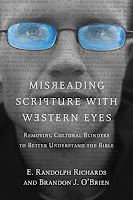In Chapter 6 of
Walking in the Dust of Rabbi Jesus, Lois Tverberg focuses on the mystery of names in Jewish culture. This is something that is very different from Western culture.
Tverberg states that from ancient times until today saying "in the name of" is the equivalent of claiming that's person's authority or behalf. It's like how today, when we pray, we often end with, "... in Jesus' name, Amen". We are claiming his status and authority as God's Son in that moment.
The idea is so much deeper in Jewish culture, however. "It's hard to overstate how important names were in Biblical times," Tverberg states on page 84. "In ancient thought, without a name, an object or being didn't even exist. Egyptian documents describe the time before creation as "when no name of anything had yet been named," and it was only when God created and named things that they officially existed.
Names in ancient Near Eastern culture were more than just descriptive words. They were reputations... legacies... identities. As we talked about in the posts "
Family is Important" and "
Misreading Scripture with Western Eyes: Honor and Shame", your name and the name of your family are vitally important in this culture. This is why when God redirected someone's life, he often changed their names (like Abram, Jacob, Saul, etc). And why Moses appealed to God's name in his attempt to persuade God not to destroy the Israelites for worshipping the golden calf in Exodus 32.
Throughout the Bible, the concept of God's name spreading throughout the earth is a common theme. And this is why the 3rd commandment, "You shall not take the Lord your God's name in vain" is such an important thing. Western Christians often see it as not swearing with God's name. But it's so much more than that. Tverberg states, "The text literally says, 'you shall not lift up God's name as an
empty thing.' One of the was that rabbis interpreted this was as doing something evil publicly and associating God with it. It is a sin against God Himself, who suffers from having his reputation defamed" (page 88).
We see examples like this every day, and throughout history. From slavery, oppression, and prejudice, people who blow up abortion clinics or abuse family members who are under their leadership. We see it in religions of the world as well—horrible things done in the name of the god they believe in. The rest of the world is thinking, 'what kind of god is this that he would want you to do such a horrible thing?" His reputation is damaged, or taken in vain, just as God's is when people do things in His name that aren't of His commands or character.
Small examples are just as important here—businessmen who will cheat others and sit on the front pew on Sunday. Or what about cutting someone off with ours car while we have Christian bumper sticker on the back? It's giving a false witness, or a witness against Christ to the world around us.
As Christians, we carry God's name in all we do and say. And while we do know this, the full meaning of it is so much deeper because of the cultural connotations that we don't have. It's name and reputation that has been proclaimed for millennia throughout the earth—the universe—with great breadth and weight. For this reason, family names are so important in Near Eastern culture—because the name will last beyond those who bear it. In the West, it's considered admirable if someone has to rise from the adversity of overcoming negative (or toxic) dynamics and start a new, separate life. This would not be a positive thing in Near Eastern culture.
In fact, I once heard a story about a Jewish woman who heard about
a practice in Germany that, due to limit land availability, grave sites are only leased for 15-30 years. After that, the grave's contents (and headstone) are removed and the land is available for a new inhabitant.
Upon hearing this, the Jewish woman said, "But what happens to their name?"
When I heard this story, I couldn't stop thinking about it. It's why it's so important to families from collective cultures to have children, and especially male children, to continue the family name. While this is important in Western culture, it's doesn't have the same gravitas. There might be shame and great pain over infertility, but the cultural implication of a complete loss of the weight of a name (identity and reputation) isn't necessarily as big of a deal. And as to people being removed from their graves 30 years after death (when it's likely that those who would visit have already passed on) is practical in light of limited land availability.
What do you think? How does the important of a name in Jewish culture from one on your own?









